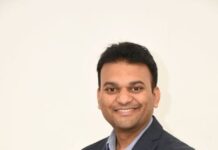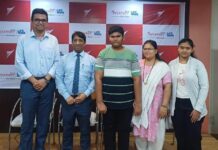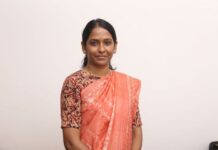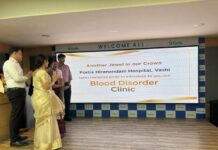Gurgaon, August 12, 2015: FORT – Fortis Organ Retrieval and Transplant organized India’s first International Summit onOrgan Donation after Circulatory Death at Fortis Memorial Research Institute(FMRI).The Summit is spearheaded byDr. Avnish Seth, Director FORT – Fortis Organ Retrieval and Transplant. The eventwas graced by Chief Guest Dr. (Prof)Jagdish Prasad,DG, DGHS, Ministry of Health & Family Welfare.
A beating heart is central to the concept of organ donation following brain death (BD). In BD, injury occurs to the brain so that the brain dies but the heart continues to beat for a few hours or days, thus maintaining vital blood supply to the organs. What if we take organs for transplanting after death, once the heart has stopped? How much time do we have? Do such organs work? What are the legal and ethical issues?
Organ donation after circulatory death (DCD) has been tried in several countries since 1995. It is widely accepted that once the heart has stopped for a period of 2 to 5 minutes, there is no possibility of a person coming back to life and organs like kidneys, liver, pancreas and lungs and even heart can be retrieved and transplanted. Organ donation in uncontrolled DCD is only possible in countries with presumed consent, like in Spain, Israel, Singapore, etc. World over, most DCDs are done after a family has been informed of the poor prognosis by a team of experts and the decision is made to withdraw medical support. Once the heart stops, the attending physician declares death and after a mandatory stand-off period of five minutes, the transplant surgeons begin the surgical recovery of the organs. However, in India there is no clear law on end of life care, withdrawal of life support and passive euthanasia. However, it is estimated that last year the process of organ retrieval could not be completed at least 50 patients with BD even when the families consented to organ donation as the heart stopped before the process of organ retireval could be completed. This is the scenario for DCD that needs to be considered in India till there is more clarity on laws related to end of life care.
The speakers at the event will be stalwarts Dr. Marti Manyalich, President, TPM – DTI Foundation, Spain. He is Chief of organ donation program at Spain which has the highest organ donation rate in the world. Dr Marti is also the President Elect of International Society
for Organ Donation and Procurement. Mr. Darius Mirza, Professor of Hepatobiliary & Transplant Surgery, QE Hospital & Birmingham Children’s Hospital, UK. He comes with an extensive experience with over 250 DCD liver transplants. Dr. Kumud Dhital is a Cardiothoracic & Transplant Surgeon, St. Vincent’s Hospital, Australiacredited with the first successful heart transplant from non-heart beating donor in Sydney, 2014. DCD earlier was acronym for Donation after Cardiac Death, but following Dr Dhital’s landmark successful heart transplant the nomenclature had to be changed to Donation after Circulatory Death, as one cannot transplant a ‘dead’ heart.
The Summit will also be attended by luminaries from the healthcare industry such as
Dr NS Dharmshaktu Additional DG, DGHS, Ministry of H & FW, Dr. Sunil Shroff, Managing Trustee Mohan Foundation and Dr. Saudan Singh, Director of National Organ & Tissue Transplant Organization (NOTTO).
Dr. Avnish Seth, Director FORT – Fortis Organ Retrieval and Transplant said, “It is an honor that Dr. Manyalich, Mr. Mirza and Dr. Dhital and noteworthy doctors from the healthcare industry haveconsented to partner us in this venture towards enlightening masses on the nobility of the act of organ donation. This is the first attempt at introducing the concept of DCD in India. We hope that this initiative helps us bridge the wide gap between demand and supply of organs significantly.”
Dr. (Prof) Jagdish Prasad, DG, DGHS, Ministry of Health & Family Welfare said, “The initiative Dr. Seth and the organization has taken in bringing together stalwarts from the healthcare industry for a cause as noble as organ donation is exemplary. It is not only a step in increasing awareness but also a step in clearing myths and cobwebs that shroud this topic.”
Mr Jasdeep Singh, Zonal Director, FMRI said, “It is a milestone of an achievement as this is a first of its kind summit. It is an honor to have luminaries from the healthcare industry come together for a humanitarian cause thatwill increase awareness to save more lives from perishing due to unjustified reasons.”
The demand for organ transplantation has rapidly increased all over the world during the past decade due to the increased incidence of vital organ failure, the rising success and
greater improvement in post-transplant outcome. However, the unavailability of adequate organs for transplantation to meet the existing demand has resulted in major organ shortage crises. As a result there has been a major increase in the number of patients on transplant waiting lists as well as in the number of patients dying while on the waiting list.In India, less than 5000 kidney transplants are carried out annually against an estimated requirement of over 175,000. Similarly, only 1000 liver transplants are performed every year in a country where over 50,000 perish due to end stage liver disease, mostly related to preventable causes like hepatitis B and hepatitis C. The annual requirement of hearts is estimated to be around 50,000 and lungs about 20,000. CCI Newswire




















